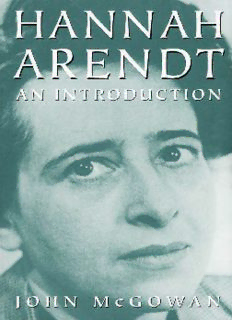
Hannah Arendt: An Introduction PDF
Preview Hannah Arendt: An Introduction
Hannah Arendt This page intentionally left blank Hannah Arendt An Introduction John McGowan University of Minnesota Press Minneapolis London Copyright 1998 by the Regents of the University of Minnesota All rights reserved. No part of this publication may be reproduced, stored in a retrieval system, or transmitted, in any form or by any means, electronic, mechanical, photo- copying, recording, or otherwise, without the prior written permission of the publisher. Published by the University of Minnesota Press 111 Third Avenue South, Suite 290 Minneapolis, MN 55401-2520 http://www.upress.umn.edu Printed in the United States of America on acid-free paper Library of Congress Cataloging-in-Publication Data McGowan, John, 1953- Hannah Arendt: an introduction / John McGowan. p. cm. Includes bibliographical references and index. ISBN 0-8166-3069-0 (hardcover : alk. paper). — ISBN 0-8166-3070-4 (pbk. : alk. paper) 1. Arendt, Hannah—Contributions in political science. I. Title. JC251.A74M395 1997 320.5'092—dc21 97-15017 CIP The University of Minnesota is an equal-opportunity educator and employer. 10 09 08 07 06 05 04 03 02 01 00 99 98 10 9 8 7 6 5 4 3 2 1 For Jane finally This page intentionally left blank Contents Acknowledgments ix A Note on Usage and References xi 1. Origins: Arendt's Life and Coming to Terms with Totalitarianism 1 Biography 1 Arendt on Totalitarianism 15 2. Politics as Identity-Disclosing Action 34 The Political and the Public 3 8 Labor and Work 42 Behavior and the Social 45 Explaining the Rise of the Social 52 Action, Freedom, and Identity in the Space of Appearances 60 A Pickup Basketball Game 70 Participatory Democracy 81 Conclusion: Recovering Citizenship 94 3. Understanding and Judging the Reality of Evil 96 The Reality of Evil 100 Thinking 108 Judging 120 Storytelling 137 Conclusion: Are We Being Political Yet? 147 4.Arendt Now 150 The Meaning of Democracy 154 A Democratic Ethos 166 Notes 181 References 185 For Further Reading 187 Index 189 Acknowledgments That I have compiled so many debts in writing so short a book testi- fies to my membership in the vibrant intellectual community that is the University of North Carolina at Chapel Hill. This book would not exist if it were not for two people I did not even know five years ago: Craig Calhoun and Susan Bickford. Craig asked me to team-teach a graduate seminar on Arendt with him; initiated and found the funds for a conference on Arendt, "Hannah Arendt and the Meaning of Pol- itics," that we ran together; and suggested that I complement the vol- ume of essays we compiled from that conference with an introduction to Arendt's thought. Through the Program in Social Theory and Cross- Cultural Studies (which he founded), Craig created an intellectual space of appearances for a whole generation of UNC faculty and stu- dents. I, a latecomer, am only one among many who benefited from Craig's generosity, vision, energy, and (not least) breathtaking bril- liance. Susan was the reader perched on my shoulder as I wrote this book. I think she has memorized every word Arendt ever wrote. She read each draft as I produced it, saved me from countless errors, talked me through any number of difficult points, and buoyed me with what I flatter myself was judicious praise. I can only hope that her theoretical acuity, political commitment, and intellectual courage enliven these pages as they do all those who are lucky enough to be her colleagues, students, and friends. My thanks to Laurence Avery and the Department of English for a study leave, and to Ruel Tyson, Lloyd Kramer, and the Institute of Arts and Humanities both for a faculty fellowship and for financial ix
